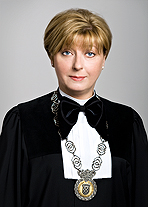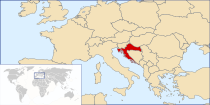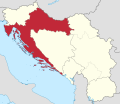| Showcase | Content | Contributing |
Croatia ( /kroʊˈeɪʃə/ ⓘ, kroh-AY-shə; Croatian: Hrvatska, pronounced [xř̩ʋaːtskaː]), officially the Republic of Croatia (Croatian: Republika Hrvatska ), is a country located at the crossroads of Central and Southeast Europe. Its coast lies entirely on the Adriatic Sea. It borders Slovenia to the northwest, Hungary to the northeast, Serbia to the east, Bosnia and Herzegovina and Montenegro to the southeast, and shares a maritime border with Italy to the west. Its capital and largest city, Zagreb, forms one of the country's primary subdivisions, with twenty counties. Other major urban centers include Split, Rijeka and Osijek. The country spans 56,594 square kilometres (21,851 square miles), and has a population of nearly 3.9 million. The Croats arrived in modern-day Croatia in the late 6th century, then part of Roman Illyria. By the 7th century, they had organized the territory into two duchies. Croatia was first internationally recognized as independent on 7 June 879 during the reign of Duke Branimir. Tomislav became the first king by 925, elevating Croatia to the status of a kingdom. During the succession crisis after the Trpimirović dynasty ended, Croatia entered a personal union with Hungary in 1102. In 1527, faced with Ottoman conquest, the Croatian Parliament elected Ferdinand I of Austria to the Croatian throne. In October 1918, the State of Slovenes, Croats, and Serbs, independent from Austria-Hungary, was proclaimed in Zagreb, and in December 1918, it merged into the Kingdom of Yugoslavia. Following the Axis invasion of Yugoslavia in April 1941, most of Croatia was incorporated into a Nazi-installed puppet state, the Independent State of Croatia. A resistance movement led to the creation of the Socialist Republic of Croatia, which after the war became a founding member and constituent of the Socialist Federal Republic of Yugoslavia. On 25 June 1991, Croatia declared independence, and the War of Independence was successfully fought over the next four years. Croatia is a republic and a parliamentary liberal democracy. It is a member of the European Union, the Eurozone, the Schengen Area, NATO, the United Nations, the Council of Europe, the OSCE, the World Trade Organization, a founding member of the Union for the Mediterranean, and is currently in the process of joining the OECD. An active participant in United Nations peacekeeping, Croatia contributed troops to the International Security Assistance Force and was elected to fill a non-permanent seat on the United Nations Security Council in the 2008–2009 term for the first time. Croatia is a developed country with an advanced high-income economy and ranks highly in the Human Development Index. Service, industrial sectors, and agriculture dominate the economy. Tourism is a significant source of revenue for the country with nearly 20 million tourist arrivals as of 2019. Since 2000s, the Croatian government has heavily invested in infrastructure, especially transport routes and facilities along the Pan-European corridors. Croatia has also positioned itself as a regional energy leader in the early 2020s and is contributing to the diversification of Europe's energy supply via its floating liquefied natural gas import terminal off Krk island, LNG Hrvatska. Croatia provides social security, universal health care, and tuition-free primary and secondary education while supporting culture through public institutions and corporate investments in media and publishing. ( Full article...) Entries here consist of
Good and
Featured articles, which meet a core set of high editorial standards.
The president of Croatia, officially the president of the Republic of Croatia ( Croatian: Predsjednik Republike Hrvatske), is the head of state, commander-in-chief of the military and chief representative of the Republic of Croatia both within the country and abroad. The president is the holder of the highest office in Croatia. However, the president is not the head of the executive branch ("non executive president") as Croatia has a parliamentary system in which the holder of the post of prime minister is the most powerful person within the country's constitutional framework and everyday politics. The president maintains the regular and coordinated operation and stability of the national government system, and safeguards the independence and territorial integrity of the country. The president has the power to call ordinary and extraordinary elections for the Croatian Parliament (in a manner specified by the Constitution), as well as to call referendums (with countersignature of the prime minister). The president formally appoints the prime minister on the basis of the balance of power in parliament and consultations conducted with the leaders of parliamentary parties, grants pardons and awards decorations and other state awards. The president and Government (Cabinet) cooperate in conducting foreign policy. In addition, the president is the commander-in-chief of the Croatian Armed Forces. The president appoints the director of the Security and Intelligence Agency in agreement with the prime minister. The president may dissolve the Parliament under circumstances provided by the Constitution. Although enjoying immunity, the president is impeachable for violation of the Constitution. In case of a temporary or permanent incapability by the president to discharge the duties of office, the speaker of the Parliament assumes the office of acting president until the president resumes their duties, or until the election of a new president within 60 days of the permanent vacancy occurring. ( Full article...)Did you know (auto-generated)
General imagesThe following are images from various Croatia-related articles on Wikipedia.
Selected biography - Selected geography article -Croatian Littoral ( Croatian: Hrvatsko primorje) is a historical name for the region of Croatia comprising mostly the coastal areas between traditional Dalmatia to the south, Mountainous Croatia to the north, Istria and the Kvarner Gulf of the Adriatic Sea to the west. The term "Croatian Littoral" developed in the 18th and 19th centuries, reflecting the complex development of Croatia in historical and geographical terms. The region saw frequent changes to its ruling powers since classical antiquity, including the Roman Empire, the Ostrogoths, the Lombards, the Byzantine Empire, the Frankish Empire, and the Croats, some of whose major historical heritage originates from the area—most notably the Baška tablet. The region and adjacent territories became a point of contention between major European powers, including the Republic of Venice, the Kingdom of Hungary, and the Habsburg and Ottoman Empires, as well as Austria, the First French Empire, the Kingdom of Italy, and Yugoslavia. ( Full article...)
CategoriesMore did you know -
TopicsRelated portalsReligions in Croatia Ex-Yugoslav countries Other countries Associated WikimediaThe following Wikimedia Foundation sister projects provide more on this subject:
Things you can do
List articlesWeb resourcesWikipedia in Croatian
Selected monthly picture
Krka National Park is one of the
Croatian
national parks, named after the river
Krka that it encloses. It is located in central
Dalmatia, in Šibenik-Knin county, just a few kilometers northeast of the city of
Šibenik.
Discover Wikipedia using
portals | ||||||||||||||
| Showcase | Content | Contributing |
Croatia ( /kroʊˈeɪʃə/ ⓘ, kroh-AY-shə; Croatian: Hrvatska, pronounced [xř̩ʋaːtskaː]), officially the Republic of Croatia (Croatian: Republika Hrvatska ), is a country located at the crossroads of Central and Southeast Europe. Its coast lies entirely on the Adriatic Sea. It borders Slovenia to the northwest, Hungary to the northeast, Serbia to the east, Bosnia and Herzegovina and Montenegro to the southeast, and shares a maritime border with Italy to the west. Its capital and largest city, Zagreb, forms one of the country's primary subdivisions, with twenty counties. Other major urban centers include Split, Rijeka and Osijek. The country spans 56,594 square kilometres (21,851 square miles), and has a population of nearly 3.9 million. The Croats arrived in modern-day Croatia in the late 6th century, then part of Roman Illyria. By the 7th century, they had organized the territory into two duchies. Croatia was first internationally recognized as independent on 7 June 879 during the reign of Duke Branimir. Tomislav became the first king by 925, elevating Croatia to the status of a kingdom. During the succession crisis after the Trpimirović dynasty ended, Croatia entered a personal union with Hungary in 1102. In 1527, faced with Ottoman conquest, the Croatian Parliament elected Ferdinand I of Austria to the Croatian throne. In October 1918, the State of Slovenes, Croats, and Serbs, independent from Austria-Hungary, was proclaimed in Zagreb, and in December 1918, it merged into the Kingdom of Yugoslavia. Following the Axis invasion of Yugoslavia in April 1941, most of Croatia was incorporated into a Nazi-installed puppet state, the Independent State of Croatia. A resistance movement led to the creation of the Socialist Republic of Croatia, which after the war became a founding member and constituent of the Socialist Federal Republic of Yugoslavia. On 25 June 1991, Croatia declared independence, and the War of Independence was successfully fought over the next four years. Croatia is a republic and a parliamentary liberal democracy. It is a member of the European Union, the Eurozone, the Schengen Area, NATO, the United Nations, the Council of Europe, the OSCE, the World Trade Organization, a founding member of the Union for the Mediterranean, and is currently in the process of joining the OECD. An active participant in United Nations peacekeeping, Croatia contributed troops to the International Security Assistance Force and was elected to fill a non-permanent seat on the United Nations Security Council in the 2008–2009 term for the first time. Croatia is a developed country with an advanced high-income economy and ranks highly in the Human Development Index. Service, industrial sectors, and agriculture dominate the economy. Tourism is a significant source of revenue for the country with nearly 20 million tourist arrivals as of 2019. Since 2000s, the Croatian government has heavily invested in infrastructure, especially transport routes and facilities along the Pan-European corridors. Croatia has also positioned itself as a regional energy leader in the early 2020s and is contributing to the diversification of Europe's energy supply via its floating liquefied natural gas import terminal off Krk island, LNG Hrvatska. Croatia provides social security, universal health care, and tuition-free primary and secondary education while supporting culture through public institutions and corporate investments in media and publishing. ( Full article...) Entries here consist of
Good and
Featured articles, which meet a core set of high editorial standards.
The president of Croatia, officially the president of the Republic of Croatia ( Croatian: Predsjednik Republike Hrvatske), is the head of state, commander-in-chief of the military and chief representative of the Republic of Croatia both within the country and abroad. The president is the holder of the highest office in Croatia. However, the president is not the head of the executive branch ("non executive president") as Croatia has a parliamentary system in which the holder of the post of prime minister is the most powerful person within the country's constitutional framework and everyday politics. The president maintains the regular and coordinated operation and stability of the national government system, and safeguards the independence and territorial integrity of the country. The president has the power to call ordinary and extraordinary elections for the Croatian Parliament (in a manner specified by the Constitution), as well as to call referendums (with countersignature of the prime minister). The president formally appoints the prime minister on the basis of the balance of power in parliament and consultations conducted with the leaders of parliamentary parties, grants pardons and awards decorations and other state awards. The president and Government (Cabinet) cooperate in conducting foreign policy. In addition, the president is the commander-in-chief of the Croatian Armed Forces. The president appoints the director of the Security and Intelligence Agency in agreement with the prime minister. The president may dissolve the Parliament under circumstances provided by the Constitution. Although enjoying immunity, the president is impeachable for violation of the Constitution. In case of a temporary or permanent incapability by the president to discharge the duties of office, the speaker of the Parliament assumes the office of acting president until the president resumes their duties, or until the election of a new president within 60 days of the permanent vacancy occurring. ( Full article...)Did you know (auto-generated)
General imagesThe following are images from various Croatia-related articles on Wikipedia.
Selected biography - Selected geography article -Croatian Littoral ( Croatian: Hrvatsko primorje) is a historical name for the region of Croatia comprising mostly the coastal areas between traditional Dalmatia to the south, Mountainous Croatia to the north, Istria and the Kvarner Gulf of the Adriatic Sea to the west. The term "Croatian Littoral" developed in the 18th and 19th centuries, reflecting the complex development of Croatia in historical and geographical terms. The region saw frequent changes to its ruling powers since classical antiquity, including the Roman Empire, the Ostrogoths, the Lombards, the Byzantine Empire, the Frankish Empire, and the Croats, some of whose major historical heritage originates from the area—most notably the Baška tablet. The region and adjacent territories became a point of contention between major European powers, including the Republic of Venice, the Kingdom of Hungary, and the Habsburg and Ottoman Empires, as well as Austria, the First French Empire, the Kingdom of Italy, and Yugoslavia. ( Full article...)
CategoriesMore did you know -
TopicsRelated portalsReligions in Croatia Ex-Yugoslav countries Other countries Associated WikimediaThe following Wikimedia Foundation sister projects provide more on this subject:
Things you can do
List articlesWeb resourcesWikipedia in Croatian
Selected monthly picture
Krka National Park is one of the
Croatian
national parks, named after the river
Krka that it encloses. It is located in central
Dalmatia, in Šibenik-Knin county, just a few kilometers northeast of the city of
Šibenik.
Discover Wikipedia using
portals | ||||||||||||||
















































































































